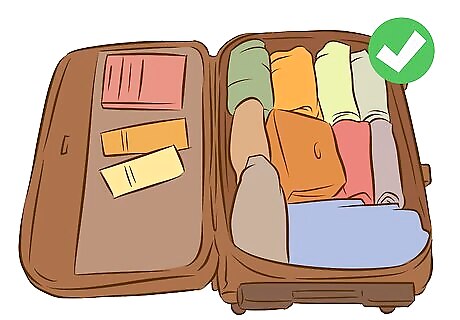
views
Getting Your Group Together

Choose friends you get along well with. You’ll be spending a lot of time with your travel companions, so think of people who have similar general travel habits and are flexible and relaxed. If you enjoy trips with lots of walking or hiking, but your friend would rather lounge by a pool all day, consider how much you’ll both be willing to compromise and if it’s worth it to invite them or not. Also consider whether a friend is an early riser or prefers to go to sleep late, and how high-maintenance they tend to be.

Decide on a date. Ask your friends when they can take time off from school or work. Narrow down preferences to a date and timespan that works for the most people. The larger your group is, the harder it will be to find a time that works for all of you. Be patient and flexible, and compromise when you can. If one or two people simply aren’t available, tell them that you’re sorry it didn’t work out for this trip and that you’ll let them know when you’re planning your next holiday with friends.

Discuss a budget early on. Ask your friends to be open about how much you’re each willing to pay for the trip, between travel, accommodation, food and entertainment costs. You’ll plan your itinerary around these loose budget constraints. For example, you could say, “I know it’s awkward, but we should talk about a budget before we start planning everything. I know I’d like to keep the full cost of the trip under $2,000, if we can!” If it starts getting too expensive for any of your friends, let them know that you understand if they’re not able to splurge for this trip, and that you’re excited to travel with them at a time that’s better for them.
Choosing a Destination

Travel abroad with a smaller group of adventurous friends. If you want to get lost in foreign cities and experience a new culture, try booking a trip to a foreign country. Since you’re traveling farther, it’s best to go with a group that’s small and easy to keep together, no more than three or four people. Choose friends who aren’t afraid to try new things and who won’t be too grumpy in the face of jet lag or long days of walking.

Go on a beach trip with a more relaxed group. If you know your friends would rather lounge by the beach or at a resort than go walking all over a city, a trip to a tropical destination might be the best choice. This is a great choice for a larger group of five people or more, because there’s something for everyone and the group can easily split up if some of the group can lay in the sun all day, while more active friends can rent jet skis or go snorkeling.

Choose a road trip for a small group that gets along well. You’ll save on airfare and make great memories as you explore back roads and small town attractions. You’ll be sharing a car together for at least a few days, so make sure that this group really meshes well together. You want friends who won’t mind stopping for bathroom breaks or pulling off to see a roadside attraction. Ask your friends to take turns driving, so one person isn’t behind the wheel the whole time.

Head for a big city with a group that loves excitement and sightseeing. An adventurous but not necessarily outdoorsy group might be well-suited for a trip to a city, where you can eat well, explore museums and attractions and check out the nightlife. This could be ideal for groups both small and large.
Creating an Itinerary for Everyone

Decide if the itinerary will be planned by one person or everyone. Some people may not want to be part of the planning process now that the major decisions have been made, so give them that option. Decide as a group to designate one or two people as the planners, especially for groups larger than four people. Use online documents to share ideas as you create the itinerary, and send out a final version when it’s all done.

Find accommodations. For an easygoing group on a tight budget, hostels may be a good choice, as they’re less private than hotels but quite a bit cheaper. A group that’s more high-maintenance might be better off sharing rooms at a hotel. For a large group, consider renting a full house or apartment. Let your group know early on if you’ll be sharing rooms, so they can choose roommates and work out any issues.

Plan transportation. Buy plane tickets early to avoid higher prices. Use public transportation if your group is small enough to keep together. Consider renting a car if you’re traveling with small children or a larger group.

Decide on daytime and nighttime activities. Research popular attractions in your destination and share them with your group. Ask everyone to tell the planners one or two things they definitely want to do. This will allow everyone’s voice to be heard and ensures that the planners don’t have to make all the hard decisions. If some activities are similar, like boating and snorkeling, try to merge them. For example, you can rent a boat for the day and bring snorkeling equipment for those who want to swim.

Factor in downtime. No matter how adventurous and energetic your group is, and no matter how much you want to cram into your trip, you won’t be able to enjoy yourselves if you’re tired and cranky. Plan frequent food stops and set aside time to go back to your rooms for a quick nap if the group is getting tired. Plan for downtime in the afternoon, especially after lunch when the group may be full and sleepy or as a quick pick-me-up before dinner.

Provide options for solo trips or splitting up. No matter how tight-knit your group is, chances are everyone will want some time to themselves at some point. Give everyone a bit of free time every day, even if it’s just an hour before dinner to take a nap, shower, or get some shopping done. Depending on your group, you may want to dedicate half or even a whole day to solo exploring. Plan a meetup spot and time, especially if you’re in a foreign country where not everyone has phone service.

Find food options. Ask your friends if they have any dietary restrictions and what their general preferences are. Research restaurants online or in travel guides and write down a couple possibilities for each day. Remind your friends that you won’t be able to accommodate everyone at every restaurant. If your group has widely varying tastes, compromise: choose a burger place one night, and go out for sushi the next. Not everyone will get their favorite food every night, but they’ll be happier to compromise knowing that their voice was heard.
Preparing for Departure

Email out departure information. Make sure everyone has the date and time of your departure in writing, so they don’t miss a flight or a train. If you’re traveling by plane, ask the group to get to the airport a few hours early and set up a meeting point so your trip starts off stress-free. Remind your group to bring any IDs necessary for traveling. If you’re going abroad, you’ll need your passport. If you’re staying in the country, make sure to bring your driver’s license or another government-issued ID card.

Pack consistently across your group. Ask that everyone keeps their luggage to just one carry-on if you want to save time at the airport or space in the car. It’s fine to bring bigger luggage, but remind your group that they’ll have to carry all their own bags. Share luggage space and items like toothpaste, shampoo or camping tents.

Communicate about clothing and weather. Tell your friends if you’ve planned a fancy dinner that they’ll need to wear nice clothes to, or if you’ll be going to places that require a dress code, such as some churches. Let them know if they’ll need swimsuits. Research the weather of your destination and send it to your friends ahead of time so everyone can plan their clothing appropriately.

Deal with currency exchange if you’re going abroad. Send out currency information and exchange rates well ahead of time so your friends can order currency at the bank. Make sure everyone has cash on them in case some establishments don’t accept credit cards, and research the country’s tipping expectations as well.

















Comments
0 comment